

Robert Reich (Why We're All Becoming Independent Contractors) Uber is estimated to be worth some $40 billion, and has 850 employees.
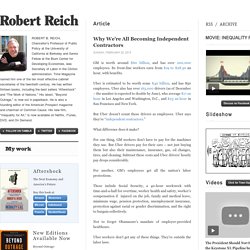
Uber also has over 163,000 drivers (as of December – the number is expected to double by June), who average $17 an hour in Los Angeles and Washington, D.C., and $23 an hour in San Francisco and New York. Uber and Lyft drivers could be categorized as employees, judge says. Drivers of ride-hailing services such as Uber and Lyft may have to be treated as employees rather than independent contractors, a federal judge in San Francisco said Friday.
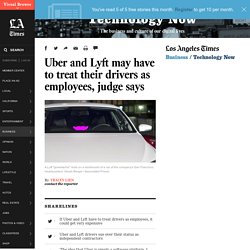
In a class-action lawsuit brought against Uber, drivers for the service challenged Uber’s policy of classifying its drivers as independent contractors unprotected by the California Labor Code. Uber-a-rising-business-model. Photo As Uber has grown to become one of the world’s most valuable start-ups, its ambitions often seem limitless.

Robert Reich: Why Work Is Turning Into a Nightmare. How would you like to live in an economy where robots do everything that can be predictably programmed in advance, and almost all profits go to the robots' owners?
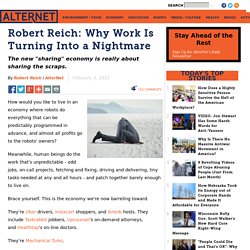
Meanwhile, human beings do the work that's unpredictable - odd jobs, on-call projects, fetching and fixing, driving and delivering, tiny tasks needed at any and all hours - and patch together barely enough to live on. Brace yourself. Lawfare vs. Uber. The number of lawsuits and police raids aimed at Uber is pretty amazing.
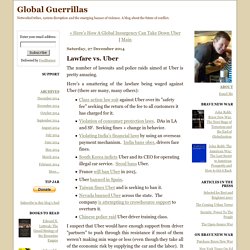
Here's a smattering of the lawfare being waged against Uber (there are many, many others): Class action law suit against Uber over its "safety fee" seeking the return of the fee to all customers it has charged for it. Violation of consumer protection laws. DAs in LA and SF. Seeking fines + change in behavior.Violating India's financial laws by using an overseas payment mechanism. I suspect that Uber would have enough support from driver "partners" to push through this resistance if most of them weren't making min wage or less (even though they take all of the economic risk by supplying the car and the labor).
PS: I call companies based on what Uber does, turking companies. Internet economics -- from global access to customers and workers via smartphones to massive economies of scale that drive costs down.An assemblyline managed by a smart phone app. Inequality Measured by Services. As this all-too-interesting year flickers out, I learned of a pair of services that seemed to distill what America grappled with becoming in 2014.
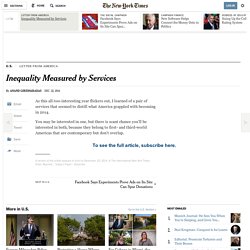
You may be interested in one, but there is scant chance you’ll be interested in both, because they belong to first- and third-world Americas that are contemporary but don’t overlap. The first service is called Alfred, and it is what it sounds like: a kind of butler service. The brainchild of two Harvard Business School graduates, it won a prestigious 2014 start-up competition organized by TechCrunch, the in-house newsletter of Silicon Valley. Writing in the Silicon Valley dialect, TechCrunch described Alfred as “the first service layer on the shared economy that manages your routine across multiple on-demand and local services.” Uber testing biometrics and lie detectors to improve safety. Uber is experimenting with lie detectors, biometrics and voice verification to screen drivers.
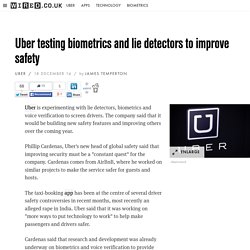
The company said that it would be building new safety features and improving others over the coming year. Phillip Cardenas, Uber's new head of global safety said that improving security must be a "constant quest" for the company. Cardenas comes from AirBnB, where he worked on similar projects to make the service safer for guests and hosts. The taxi-booking app has been at the centre of several driver safety controversies in recent months, most recently an alleged rape in India.
Uber said that it was working on "more ways to put technology to work" to help make passengers and drivers safer. Cardenas said that research and development was already underway on biometrics and voice verification to provide "enhanced driver screening". "We are exploring new ways to screen drivers globally, using scientific analysis and technology to find solutions," Cardenas said.
The secret to the Uber economy is wealth inequality. There is no silver bullet in medicine, but exercise comes close.
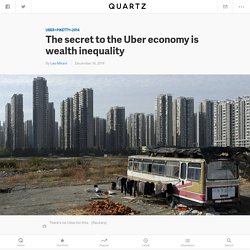
The benefits of physical activity are so far-reaching that, if you do nothing but get some gym time every day, you will live a healthier and longer life than most people. So when I decided to move closer to my office in London, the first thing I thought I’d change about my lifestyle was cycling to work. Yet, given all the harm we know air pollution can cause, does cycling actually help, or could it hurt?
The time is now for a cooperative sharing economy! For hackers, “long tail workers,” and labor activists, now is the time to step up their efforts before the network effect chisels brands like Uber into stone.
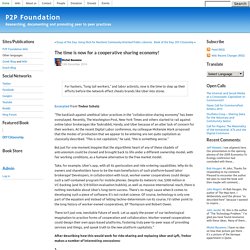
Excerpted from Trebor Scholz: “The backlash against unethical labor practices in the “collaborative sharing economy” has been overplayed. Recently, The Washington Post, New York Times and others started to rail against online labor brokerages like Taskrabbit, Handy, and Uber because of an utter lack of concern for their workers. At the recent Digital Labor conference, my colleague McKenzie Wark proposed that the modes of production that we appear to be entering are not quite capitalism as classically described. Owning is the New Sharing. One chilly morning last winter, I reconnected with an old friend, Joel Dietz, on a video chat.
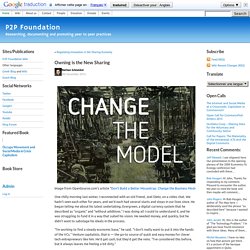
We hadn’t seen each other for years, and we’d each had several starts and stops in our lives since. He began telling me about his latest undertaking, Evergreen, a digital currency system that he described as “organic” and “without additives.” I was doing all I could to understand it, and he was struggling to fund it in a way that suited his vision. The rise of the Ubertarian - The Washington Post. A true sharing economy requires new equitable forms of ownership. Léonard and his collaborators are part of a widespread effort to make new kinds of ownership the new norm. There are cooperatives, networks of freelancers, cryptocurrencies, and countless hacks in between.
Proposals are being made for a driver-owned Lyft, and Amazon Mechanical Turk workers are scheming to build a crowdsourcing platform they can run themselves. Each idea has its prospects and shortcomings, but together they aspire toward an economy, and an Internet, that is more fully ours. Excerpted from Nathan Schneider: “VC-backed sharing economy companies like Airbnb and Uber have caused trouble for legacy industries, but gone is the illusion that they are doing it with actual sharing. Wonolo, Temp Worker App, Shows Scary Future of Sharing Economy.
The last few years have brought an explosion of startups, like Uber and TaskRabbit, that effectively act as middlemen. These companies don’t actually employ the workers who ferry passengers around town or assemble strangers’ Ikea furniture. The Creepy New Wave of the Internet by Sue Halpern. The Zero Marginal Cost Society: The Internet of Things, the Collaborative Commons, and the Eclipse of Capitalism by Jeremy Rifkin Palgrave Macmillan, 356 pp., $28.00 Enchanted Objects: Design, Human Desire, and the Internet of Things by David Rose Scribner, 304 pp., $28.00 Age of Context: Mobile, Sensors, Data and the Future of Privacy. Most of the Sharing Economy is a Rental Economy and should be regulated as such. Renting is not sharing: it should be regulated and taxed!! “Under a rhetoric guise of “sharing”, websites like AirBnb or Uber are creating a new informal economy of uninsured workers whose entire life is up for rent, from cars and homes, to their own hands available to perform chores for a fee in sites like “taskrabbit ”.
Putting the “Sharing” Back into the Sharing Economy. Bruce Sterling - Smart City States. The “Sharing” Economy. I am going to be on a panel at the New Museum on Thursday, June 19 about the “sharing” economy, and why that name is highly misleading. Here’s the flier for it: Here are some points about the sharing economy that I listed this afternoon on Twitter: And below is a book review of “sharing” economy “bible” What’s Mine Is Yours that I wrote in October 2010. Where money is not itself the community, it must dissolve the community. — Karl Marx, Grundrisse Like capitalism, consumerism has proven adept at assimilating critiques and adapting to them.
When critics argued that acquiring goods didn’t necessarily lead to lasting happiness and that accumulation of stuff merely puts us on a hedonic treadmill, marketers like Paco Underhill began to emphasize shopping “experiences,” a bit of rhetorical prestidigitation whereby consumer items became souvenirs of promised states of feeling rather than their source.
Is Sharewashing the new Greenwashing? There’s a debate going on about what a “sharing economy” actually constitutes – and that’s a good thing. Don't buy the 'sharing economy' hype: Airbnb and Uber are facilitating rip-offs. The "sharing economy" – typified by companies like Airbnb or Uber, both of which now have market capitalizations in the billions – is the latest fashion craze among business writers. Scribd.
Sharing isn’t always caring. In the beginning, there was sharing. That, at least, is the story according to Dominik Wind, a German environmental activist with a genial smile and a cycling cap whom I met in Paris while attending a conference earlier this month about the sharing economy. How many of you are tired of the bullshit speak coming from the Sharing Economy startups? - Startups Anonymous. Why The Sharing Economy Isn’t - Whimsley. So a couple of months ago Douglas Atkin, head of Community and E-staff Member at AirBnB, took to the stage of the Le Web conference in London ( video ) to announce the formation of Peers : “a grassroots organization that supports the sharing economy movement.” I like grassroots organizations and I like the co-operative impulse, but this… Well here is his speech (in quotation marks) in its entirety with comments from yours truly.
I joined AirBnB about four months ago, but I’m going to talk about a different organization. He means Peers . In fact I’d like to talk about a movement for the sharing economy. By “a movement” I mean exactly that. A grassroots organization with 40 corporate “partners”, with unspecified but significant funding, formed with guidance from a set of high-profile “thought leaders”, without local chapters, and with nothing much for the grassroots to do, but with an Executive Director on day one. And what we’re not talking about here is venture capital. Also Known as the Collapse of the American Dream.
Your opportunity to be a "micro-entrepreneur": By cleaning other people's homes or renting out your spare room. Thomas Friedman, and others, have recently extolled the virtues of the sharing economy (see "Welcome to the Sharing Economy," or "How to Monetize Your Closet"). At the risk of bragging, my immigrant parents were clearly trendsetters in this area. Franchise redux: The professionalization of the sharing economy has deep implications. After Crisis, Greeks Work to Promote ‘Social’ Economy. Photo. Is the Clock Ticking for the Sharing Economy? The clock could be ticking for businesses like Airbnb, Wimdu, 9Flats and HouseTrip as new regulations gradually being introduced in some cities around the world begin to threaten their core business – but the problem is bigger than that.
While stories like Airbnb’s future in New York being questioned as a result of short-stay regulations have made headline news in the past, there’s a growing backlash against the sharing economy that could spread to other industries. The sharing economy: a short introduction to its political evolution. Can the sharing economy movement address the root causes of the world’s converging crises? Dan Hill's Opinion column on the Uber taxi app and civic services. Opinion: in his latest column, Dan Hill examines what services like the Uber taxi app mean for cities and asks whether the designers of public services can learn something from them. Uber Über Alles. In my previous column, I suggested that the big deal about self-driving cars was not that they could drive themselves but that they could be shared rather than owned. Sharing and Caring. The Exploitative Business Logics Behind the Sharing Economy. How to Frame the Sharing Economy Narrative (and Move On)